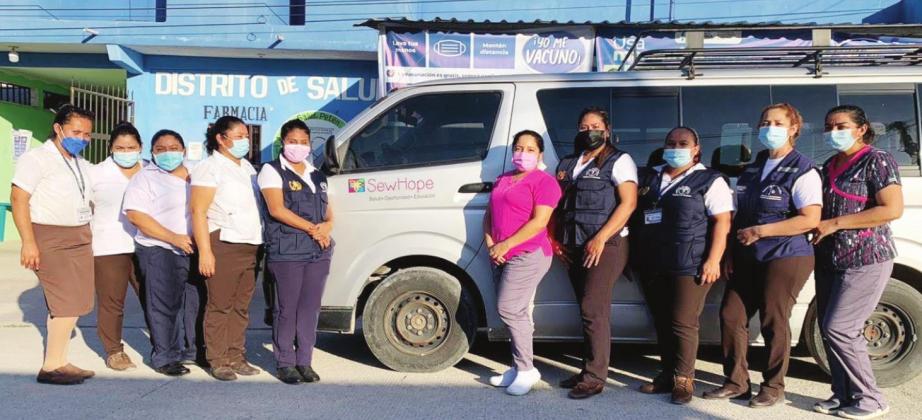CERVICAL CANCER is not often an issue among American women because of preventive medicine, but women in other parts of the world are not as fortunate. Dr. Anne Ruch of Ottawa Hills learned that firsthand in her initial trips to Guatemala.
Those trips laid the groundwork for an involvement in that Central American country by the nonprofit she founded, SewHope, which has evolved far beyond its original goal of preventing cervical cancer. Today, the people in that remote area are working toward having access to sustainable food production, clean water, education, health care—and the possibility of a healthy life and a promising future.
All of that is because of the largess of the Toledo community and beyond, and by what Ruch attributes to faith and persistence. “I first went to Guatemala in 1998 to see how our church could support people there,” Ruch said. “I found overwhelming poverty. As an obstetrician and gynecologist, I brought in short-term medical teams.”
At the start, the efforts of her and her teams were in Guatemala City, where many other nonprofits were also based. “Little by little, though, my husband [Randy Ruch] and I wondered whether we really were helping. We wanted to help in a more meaningful, impactful way.”
They eventually settled on a remote region where nonprofits didn’t venture, in the country’s northern part, bordering Mexico and Belize. “Originally, we rented a little house and used it as a health clinic. I would go there about three times a year. Then we hired two fulltime employees to be there.”
In 2007, SewHope became an official nonprofit. The name comes from the idea of sowing hope as in sowing seeds for plants. The spelling was changed to “sew” using the initials of and honoring Shannon E. Wilson, a young physician who was on several of the early Guatemalan trips but who passed away before fulfilling her dream of becoming a missionary.
“A clinic could only do so much,” Ruch said. “To change lives, people need clean water, food, education—the school system there was abysmal.” Again, little by little, she said, growth happened.
Then in 2015, SewHope grew to the point of being able to buy four acres in that region. Up went a professional clinic, which spawned more public health projects, and a hostel to house the teams of volunteers.
Through a partnership with the Guatemalan Ministry of Health and the University of Texas—the school that Shannon E. Wilson attended— SewHope is starting a program to train nurses and health practitioners to screen for cervical cancer. “Cervical cancer is completely preventable,” said Cecilia Chaudhary, the nonprofit’s development director. “We have such a focus on preventive health here. In Guatemala, there is no such focus, and we would like to change that.”
Chaudhary added, “This spring we are hoping to purchase a new portable ultrasound machine. Most Guatemalan women never receive an ultrasound during pregnancy, and the portable one will allow us to detect potential prenatal issues in women who live in rural villages.
“This mission started out as a cervical-cancer-prevention program,” Chaudhary said, “and that’s still one of the main focuses. The public education system in Guatemala is unfathomable. We saw there was a need, which evolved into our current education program.”
SewHope’s half-day education program began in 2011 and currently has 128 students enrolled. This past month construction was completed on their new school building. Ruch said each student has a sponsor—at $500 a year—which provides for a uniform, shoes, a backpack, and school supplies.
And quite a school it is, despite its remoteness. Ruch said when she was there in March electricity was hooked up and fiberoptic cable was installed. She credited Kenyon College professor Jim Skon and his friend Doug Karl with having internet and computers available for the students.
Financing SewHope’s mission is active fundraising year-round. “We’re not part of a big umbrella organization,” Chaudhary said. “The more we can educate people on what we’re doing, it might strike a chord with someone”—which it did a couple years ago.
Chaudhary and Ruch each independently told the story of the annual one-day auction that’s the signature fundraiser where Ruch offhandedly said she’d accept $60,000 from anyone who would like to build a new school. Later that evening, a person contacted Ruch and made a $60,000 donation that enabled the start of constructing the new school.
Reflecting on how far SewHope has come and the good that it’s done and will do, Ruch said, “It’s been like, honestly, unbelievable this has happened. It’s incredible the number of people who would join you. Whenever we’re doing anything, the miraculous seems to happen.”
There’s a wider message. “For anybody who thinks something is needed and is overwhelmed, if you just start, anything can happen. God opens doors constantly.”
She concluded, “We’re just a small organization that started in Toledo that’s doing big things to change the lives of people in Guatemala.”
Donations can be made at SewHope’s website: sewhope.org.
Dennis Bova is a freelance writer and editor. ✲


